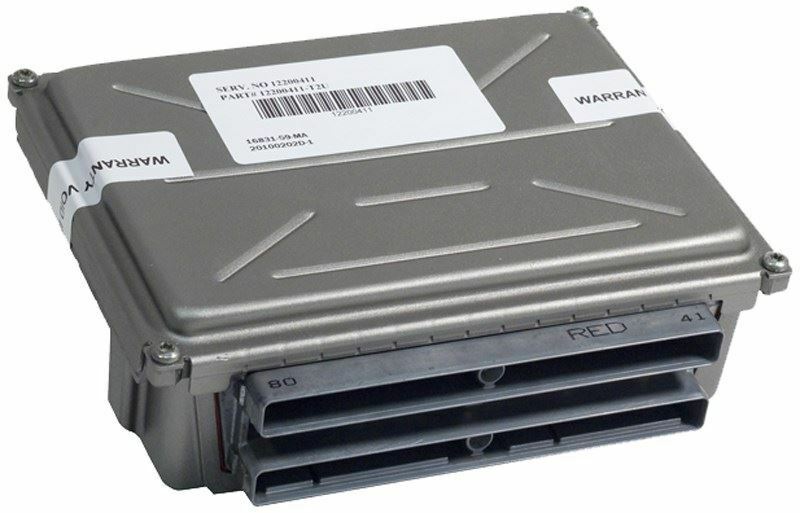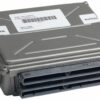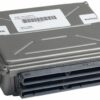Is Your Buick Riviera Running Rough? The PCM Might Be the Culprit.
If your 1998 Buick Riviera is experiencing perplexing issues like erratic shifting, poor fuel economy, a persistent check engine light, or even a no-start condition, the problem may lie deep within its electronic nervous system: the Powertrain Control Module (PCM). As the central computer for your vehicle, the PCM is responsible for managing everything from the engine’s fuel mixture and ignition timing to the transmission’s shift points. When it begins to fail, it can cause a cascade of problems that are often misdiagnosed as individual sensor or component failures, leading to costly and frustrating repairs that don’t solve the root issue.
From the Diagnostic Bay
I once had a 1998 Park Avenue—which uses this exact same module—come into the shop with a persistent P0300 random misfire code. The owner had already replaced the spark plugs, wires, ignition coils, and even the crankshaft position sensor, spending hundreds of dollars with no success. The engine still idled poorly and hesitated on acceleration. After hooking up our professional scan tool, we noticed that the fuel trim data was completely erratic and the injector pulse width was inconsistent across all cylinders. This pointed not to a mechanical issue, but a processing one. We swapped in a correctly programmed PCM, and the car immediately smoothed out and ran like new. It’s a classic case of the ‘brain’ failing, not the ‘body’, and it highlights the importance of diagnosing the entire system.
Common Symptoms of a Failing PCM
A faulty PCM can manifest in numerous ways. If you’re noticing any of the following symptoms, it’s a strong indicator that your vehicle’s main computer needs attention:
- ✔ Persistent Check Engine Light (CEL) with various, often unrelated, trouble codes.
- ✔ Engine stalling, stumbling, or hesitating during acceleration.
- ✔ Harsh or erratic automatic transmission shifting.
- ✔ A noticeable drop in fuel efficiency.
- ✔ The engine cranks but refuses to start.
- ✔ Communication errors with diagnostic scan tools.
- ✔ Failure to pass an emissions test.
The Plug-and-Play Solution: A VIN-Programmed 1998 Riviera PCM
This isn’t just a replacement part; it’s a complete, ready-to-install solution for your vehicle. We take the guesswork and the need for expensive dealership programming out of the equation. When you order this 1998 Riviera PCM, we use the Vehicle Identification Number (VIN) you provide to flash the module with the latest, most stable software updates directly from GM. This ensures that the unit is perfectly matched to your car’s specific configuration, including its engine, transmission, and factory options.
This module, service number 9366314, is a direct-fit replacement for a wide range of GM vehicles from the late 1990s, including the Buick LeSabre, Pontiac Grand Prix, Chevrolet Lumina, and many more. It directly replaces several original service numbers, including 09356741, 16236757, 9357034, and 9357440, guaranteeing broad compatibility and OEM-level performance. By installing this pre-programmed module, you are restoring your vehicle’s core operational logic, allowing all related systems to function as they were designed from the factory.
Upon installation, you may need to perform a simple security relearn procedure (often called a VATS relearn), which can typically be done without special tools and involves a sequence of key turns. This syncs the new PCM with your vehicle’s anti-theft system. Restoring your vehicle’s performance and reliability is as simple as ordering the correct part, providing your VIN, and installing the ready-to-go module.
Frequently Asked Questions
Do I need to have this PCM programmed by a dealer?
No. We handle all the programming for you before shipment. Simply provide us with your vehicle’s VIN during checkout, and the module will arrive with the correct software for your specific car, ready for installation.
What is a VIN and where do I find it?
The VIN is your vehicle’s unique 17-digit identification number. You can typically find it on a small plate on the driver’s side of the dashboard (visible through the windshield), on your vehicle’s registration, or on your insurance card.
Is installation difficult? Can I do it myself?
For many of the compatible vehicles, the PCM is located in an accessible area, often under the dash or in the engine bay. Installation typically involves disconnecting the battery, unplugging the electrical connectors, and unbolting the old module to swap in the new one. It is a manageable job for a DIY mechanic with basic tools.
Will this fix my check engine light?
If the check engine light is caused by a faulty PCM, then yes, this part will resolve the issue. However, it’s crucial to ensure that the codes are not being caused by other failing components. A proper diagnosis is always recommended.
What other part numbers does this module replace?
This module, 9366314, is a direct replacement for several service numbers, including 09356741, 16236757, 9357034, and 9357440, ensuring wide compatibility across many GM models.


